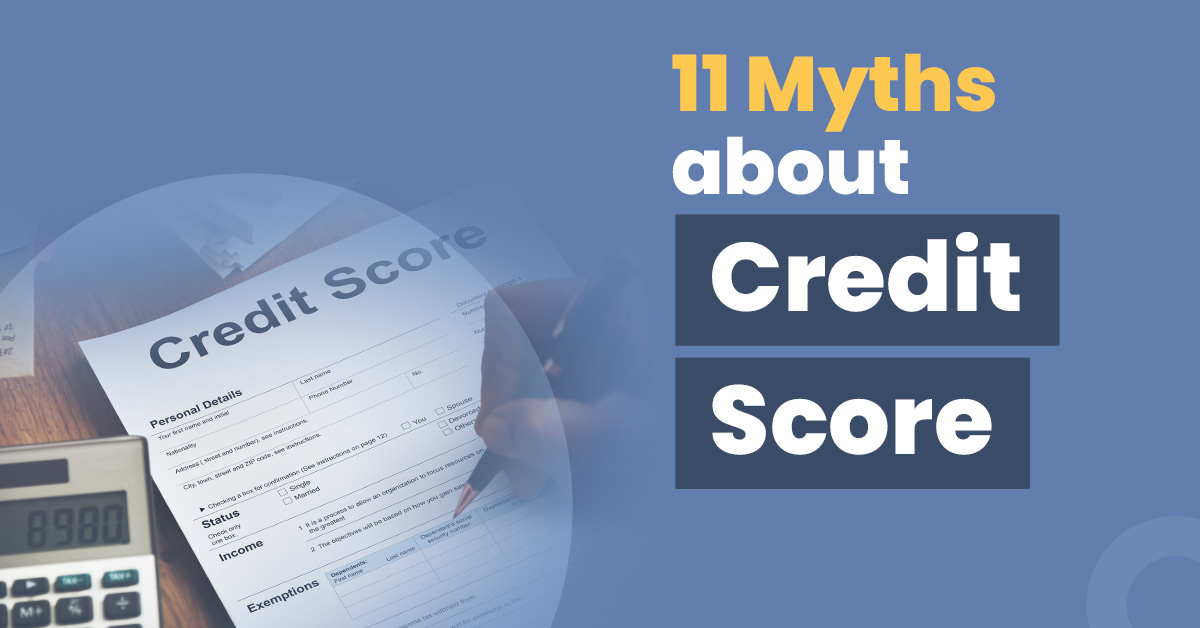11 Common Myths about Credit Score


Credit score plays a vital part when you apply for any form of credit/loan. It is a critical factor considered during loan applications or credit card requirements. However, due to a lack of knowledge and awareness, there are several myths about credit scores. In this article, we are going to bust those misconceptions and show the reality behind them.
Myths about Credit Scores
Checking the credit report lowers the Credit score
This is one of the most common myths about credit scores. Irrespective of the number of times you check your credit report, your Credit score will not get affected. However, if multiple lenders enquire about your credit details in a short time period, it can lower your Credit score. Checking your credit score at regular intervals will help you keep track of your financial behaviours and activities. Further, it will assist you in taking steps to improve the score, if needed.
Getting married will merge your Credit score
The marital status of a person does not affect his/her credit score in any manner. If you apply for a joint loan with your spouse, the credit score of each applicant will be considered while deciding the loan terms. Further, having a joint bank account will not impact your credit score.
Your Credit score is determined by your annual income
The Credit score of a person does not depend on their annual income. For example, an individual may earn lakhs per month but have a poor credit score due to irresponsible financial behaviours. The Credit score depends on the number of credit lines and the ability of the person to manage those credits.
Everyone can check your credit score
This is yet another common misconception related to credit score. The credit score of a person can only be checked by the person himself or the financial institution after getting permission from the borrower.
Paying off the loans will remove the transactions from the credit report
A debt of any sort stays on your credit report and impacts the credit score for several years after the clearance of the debt. These entries demonstrate the way you have managed your debts and financial activities. Any negative information might stay on your credit report for up to 7 years. On the other hand, bankruptcy reports might persist for as long as 10 years.
Credit repair agencies can fix credit scores
While searching for methods to improve credit scores, one may come across the term “credit repair agencies”. By the name, people may get confused that these agencies are companies that can improve a bad credit score overnight. Nevertheless, these agencies do not function in this manner.
These agencies help candidates file credit disputes in their credit reports. Errors in a credit report can range anywhere from incorrect names to wrong balance inputs. Such errors should be reported to the credit bureaus at the earliest, as they impact the credit score significantly.
Closing credit cards can improve credit score
Credit rating bureaus closely monitor the way a person manages multiple lines of credit. Hence, it is advisable to keep old credit cards active and make minimal transactions with those cards. Taking loans from credit cards and repaying the amount before the due date improves the credit score.
Opting for new credit lines will lower your Credit score
The above-mentioned statement is justified in case a person applies for multiple credit facilities within a short time span. This happens because every time a person applies for a credit, a hard inquiry gets recorded in the credit report. Numerous hard inquiries indicate that the person is eager for credit, and this lowers the credit score.
People with poor credit scores cannot get loans
The credit score of an individual is not the only determining factor for the approval of a loan application. Several other factors, such as the applicant’s income, co-applicants credit score, applicant’s market reputation, etc., play a major role in deciding the outcome of the approval process. Nevertheless, an individual with a poor credit score can be granted credit but at a higher rate of interest. Moreover, individuals with low credit scores can avail loans from P2P platforms
Nothing is better than a zero credit history
Financial institutions lend money to an applicant based on their creditworthiness which can be determined by their credit history. Hence, having a zero credit history is not the right financial decision. A good credit score requires you to have some credit history. Make sure to borrow a small amount and repay in time to build some credit history. This will enable you to avail a higher loan amount with lower interest rates in the future. In this way, you can avail a higher amount of loan with comparatively lower interest rates.
Applying as a co-applicant will not affect the credit score
Seeing from the point of view of a credit agency, opting to be a co-applicant is the same as applying for credit on your own. The loan amount will impact the credit utilisation ratio, and even a single delay in the payment can negatively impact your Credit score.
Final Words
We hope that this article was able to clear your views related to the myths about credit scores. Gaining proper knowledge about credit scores will help you maintain a decent score and enhance your creditworthiness significantly.
Frequently Asked Questions:
What are the five things that impact the Credit score of a person?
Primarily, 5 factors that affect the Credit score of a person are as follows: borrower’s repayment history, the total debt amount, the age of the credit accounts, credit mix and new credit lines/enquiries.
What are the three things that negatively affect your Credit score?
Your credit score will get negatively affected in the following circumstances:
> Late repayments
> Numerous credit inquiries within a short time span
> Borrowing more than your monthly income
> Maxing out the limit of credit card freque
Can I check my CIBIL score free of cost?
Yes, you can check your CIBIL score free of cost once every year from the official website of TransUnion CIBIL. However, to check your credit report and CIBIL score more than once, you will need to opt for a subscription plan.




